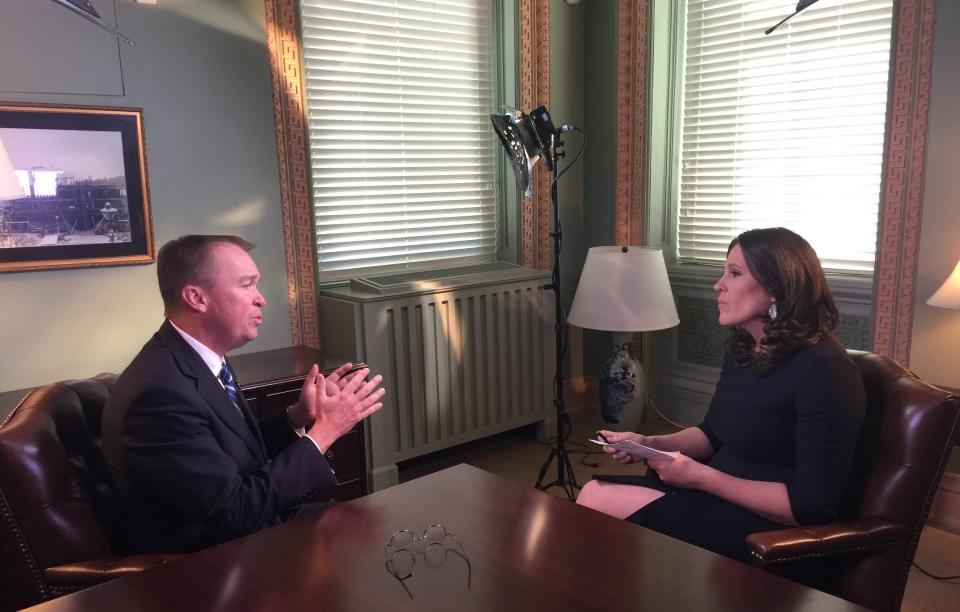Mick Mulvaney: 'The appetite for spending reductions is very low'
Director of the Office of Management and Budget (OMB) Mick Mulvaney used to push for spending cuts out of concern for the deficit. But now he has had to look at the other side of the equation: pushing for growth.
“I’ve been here six and a half, seven years now. And I’ve come to the realization that we are never going to balance the budget based just on spending reductions,” Mulvaney told Yahoo Finance. “We are not going to cut our way to balance. The attitude just doesn’t exist for that on Capitol Hill.”
As the Trump administration pushes its tax reform framework, Mulvaney said his goal is to find a way to balance the budget, and he has realized he can’t do it based on spending reductions.
“The appetite for spending reductions is very low. So as the budget director trying to figure out a way to balance the budget, I have to look at the other side of the equation.”
And the other side of the equation is about raising revenues with economic growth, Mulvaney said.
“Can I figure out a way to raise government revenues in order to close the deficit? And Democrats would say you do that by raising taxes. Republicans say you do that by growing the economy so that as the economy gets bigger, revenues increase to the federal government,” he said. “That’s why I’m so heavily involved in taxes, so interested in seeing the tax bill pass. I need that economic growth in order to drive the government receipts in order to reduce the size of the deficit.”
Independent analysis of the administration’s tax framework from the Tax Policy Center estimates it will cause a $2.4 trillion reduction in federal revenues in the first decade.
The potential of the economy
But Mulvaney insisted this will be paid for with growth.
“I think it impacts the deficit for a short period of time,” he said. “You will see a short-term spike in the deficit. But we really do believe that by growing the economy, the longer term deficits will be reduced.”

Many economists have questioned the assertion the US economy can hit 3% long-term growth to offset costs. The skepticism comes particularly as in the last 50 years, US growth has never hit this number for more than three consecutive years, not to mention that it does not account for a potential recession in the next decade.
Mulvaney said instead that Americans underestimate the potential of the economy.
“The potential within the American economy is greater than I think a lot of folks believe,” Mulvaney said. “Or they don’t remember. They just don’t remember what it’s like. The way it translates into ordinary families’ lives is great. If you get fired, you know you can find another job. If you get laid off, you know you can start your own business. Those are the things you can do when the economy’s going at 3% or greater. Things you can do when the economy is healthy. ”
By many measures, though, the employment picture is currently strong, with a recent uptick in wages, a low unemployment rate of 4.2%, improving participation and more job openings.
Mulvaney paints a different picture.
“We have lived in a very tepid, sluggish American economy now for a decade. And that’s why I think people’s expectations are so much lower than they used to be,” he said. We think that 1.8% view of the future is very pessimistic. We think we can get back to 3%. We think we can do better. And we think that tax reform is a big part of that.”
Nicole Sinclair is markets correspondent at Yahoo Finance
For more from Yahoo Finance’s interview with Mick Mulvaney, see here:
Mick Mulvaney: The size of the debt concerns me
Please also see:
Gary Cohn: Here’s how I expect corporate tax cuts to spur growth
Gary Cohn: We won’t put conditions on repatriated cash, and we’re fine with stock buybacks
Gary Cohn: ‘The estate tax is really about small business’
Gary Cohn: ‘We have to have a permanent change in the tax system’
